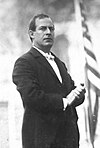In 1896, William Jennings Bryan ran for President of the United States. The former Democratic congressman from Nebraska, who gained his party's presidential nomination in July of that year after electrifying the Democratic National Convention with his Cross of Gold speech, was defeated in the general election by the Republican candidate, former Ohio governor William McKinley. Born in 1860, Bryan grew up in rural Illinois and in 1887 moved to Nebraska, where he practiced law and entered politics. He won election to the House of Representatives in 1890, and was re-elected in 1892, before mounting an unsuccessful Senate campaign. Despite the loss, he set his sights on higher office, believing he could be elected president in 1896 even though he remained a relatively minor figure in the Democratic Party. In anticipation of a presidential run, he spent much of 1895 and early 1896 making speeches across the United States; his compelling oratory increased his popularity in his party. After gaining the nomination, he undertook an extensive tour by rail to bring his campaign to the people, speaking some 600 times, to an estimated 5,000,000 listeners. His campaign focused on prosperity through bimetallism (or free silver), an issue which failed to appeal to the urban voter. (Full article...)
Recently featured: History of Sesame Street – William Warelwast – Abuwtiyuw
